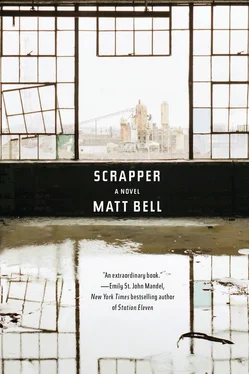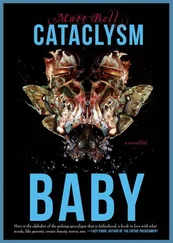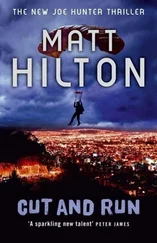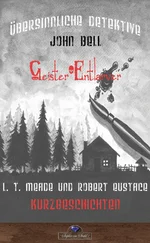You can always come home, his father said.
Back home Kelly’s grandfather had worked for the copper mines in the state’s Upper Peninsula, his father in the auto factories near the town named like poison. The mines were long exhausted, the mine towns exhausted too. The factories weren’t hiring or they were paying half wages and no benefits or they were closed. If there wouldn’t be work, what else was there to go home to? Nothing Kelly wanted again.
Gas was cheap and a dollar could buy Kelly twenty miles in his ancient red Firebird, the car all he had to show for a year spent in fast food, his wrestler’s body hungry over the fryers. How far he escaped depended on how he drove but he wasn’t so careful in those days, liked to depress the pedal past prudence. He picked a southern city, rented an apartment, slowly bought used furniture, dishes, appliances. Then a progression of years, compressed into a list of occupations: there was work in kitchens, work in lumberyards, work painting the sides of houses, and then building houses too, framework and roofing and drywall, wallpaper and paint. There were girls but for a long time nothing steady. All he had left were isolated incidents, recurring images preserved by their rarity: the opening clasp of a front-closure bra, the first time a hand slid down the front of his undone jeans without his asking, the way community-college legs crossed in the low cramp of the Firebird’s passenger seat.
He didn’t remember anyone’s name from those years. Not the names of the girls, not the names of the boys he had wrestled with, not the names of the men he had worked beside.
As a boy he’d thought to know the name of a thing was to love it. But his father had known his name. So had his mother who had done nothing, said nothing.
There was a painter with the construction outfit with hands too big for his body and after a shared brawl in a dive bar parking lot it was this man who first took Kelly to the gym, said he saw a nervous energy Kelly needed somewhere to put. Kelly lowered his bruised face and said yes, lifted his busted hands. He’d missed the combat part of wrestling, the working out of aggressions in the mat room. Together Kelly and the painter lifted weights, hit the speed bag and the heavy bag until the painter said Kelly was ready to spar.
The painter was right: there was something Kelly had been looking for and here in the gym he was finding it, better than wrestling. More his own. The absence of his father, his father’s coaching. The complete absence of team . When sparring Kelly didn’t have the right kind of quickness and he wasn’t strong enough but he was plenty angry if provoked right. He’d move his feet wrong, sluggish, hold his hands too wide, but after the first few punches got through he’d discover his anger, find his gait. He wore himself out quick and never won anything but he made a lot of faces uglier, colored some ribs black and blue. He told the painter he saw better with blood in his eyes, with one eye bruised shut. He didn’t smile when he was joking. He didn’t know how to look friendly enough with his teeth bared.
What he remembered most was how much he had wanted the hitting, the being hit. Direct damage replacing submission, fists in place of locks and holds. He craved the space right before a punch landed in either direction, how there was a second where you could put a thought in harm’s way, let it get pulverized within a crater of flesh. He started to cut all ties with home, as easy as refusing to call. By the time he came back north, many years later, he had all the agency he’d ever thought to wish for. Even if his parents had lived forever he would have found a way to orphan himself.
He went to the church on the wrong days too, to watch other people pray. The kneeling and rocking, the low murmur of their speaking in tongues, mimicking the voices of angels. The habits of his parents, his parents’ friends, the parents of his friends. The prayers of thanks, the prayers of protection from suffering, the prayers of thanks for how suffering made them strong. He’d carried a rosary in his pocket long after he stopped believing but one day he’d left it behind, abruptly filled with ridiculous mistrust of its possession. He wasn’t about to start speaking in tongues again but he still liked the way those beads looked between other people’s hands.
When he didn’t understand what he saw he took a picture with his phone: a sign he hadn’t seen before, the absolute shadows of dusk on a street lacking streetlights, a high cast of graffiti, a flyer bearing the insignia of the city watch, the orange-clad volunteers he occasionally saw in the zone. Or else inside the houses, some configuration of wiring he wasn’t familiar with: knob and tube, the Carter system, the California three-way. He took pictures of his queries and sometimes he discovered their answers but other times he hit some wrong button and reversed the camera to accidentally take a picture of his own face, this man covered in dust and sweat and always sporting the same grime-stained expression. There was a record of his year in the city accumulating in the camera roll but who was he supposed to show the pictures. There was an icon on the screen meaning share but it wanted to know who with.
The city was famous for its music and when Kelly knew he wouldn’t sleep he went looking for the sound he remembered. On the best nights the music pounded heavy from the PA, its rolling torpor loud enough to make talent an irrelevant measure. He set himself apart, moved his feet and his arms in his own approximation of the rhythm. He wasn’t without feelings but he was aware of their constrained range, his distance from their centers.
The band quit the stage, the drinkers hung on to the rail. The door to the parking lot opened, admitted a woman on her own, arrived late enough to skip the cover. There was an open seat beside Kelly but there was a longer run of seating on the opposite end of the rail, around the curve, past the uninhabited waitress station.
Kelly watched the girl make the turn, sensed something surprising drag at his gaze.
When he thought about this moment afterward, he could see her limp more clearly, but this wasn’t memory, just familiarity’s revision.
He would call her girl from the start but even then he knew she was the same age as him, maybe older. From across the rail he watched her hands move, her bare fingers lighting cigarettes, tearing the labels away from consecutive bottles of beer, her painted nails scratching at the brown glass. He raised a hand to the bartender, sent another beer around the bar. The girl with the limp didn’t acknowledge the drink but he watched her smile to receive it.
There was a kind of bravery in his heart but it didn’t prevent him from knowing what he was. He wasn’t afraid of self-deception except in others.
When she left the bar she left on foot, which meant she lived in the neighborhood. There were others who lived here too but not in every house. She was a block ahead and now he saw her limp entire, the way one foot dragged and turned, the extra sway it added to her step. She slowed, turned the corner away from these houses and toward the rare apartments beyond. Even before she reached the stairs leading up to the barred gate of her building he knew she knew he was behind her. He tried to signal his innocence but what did innocence look like. He could smell the city and he could smell himself, a shared pungency. He wiped at his face and ran his fingers through his hair and on his hands he smelled his cigarettes mixing with stolen steel, copper’s tang, the other alloys and elements each inert until touched. Even every handful of coins smelled like its owner and on his hands he could smell all the old metal of the city, the dead sweat of its lost citizens mingled with his own living scent.
Читать дальше












